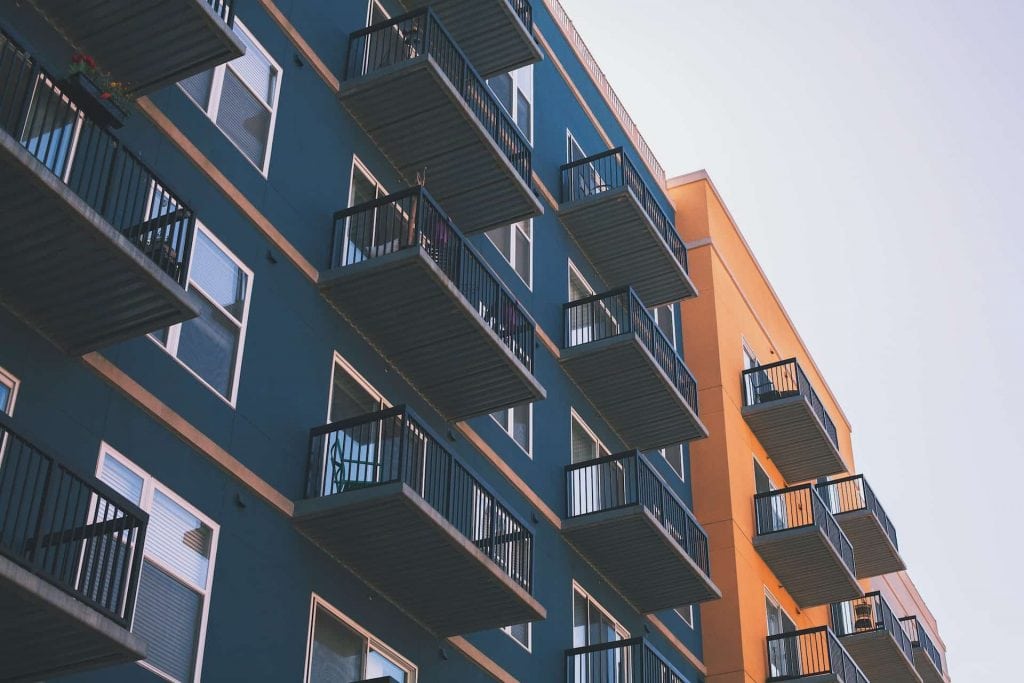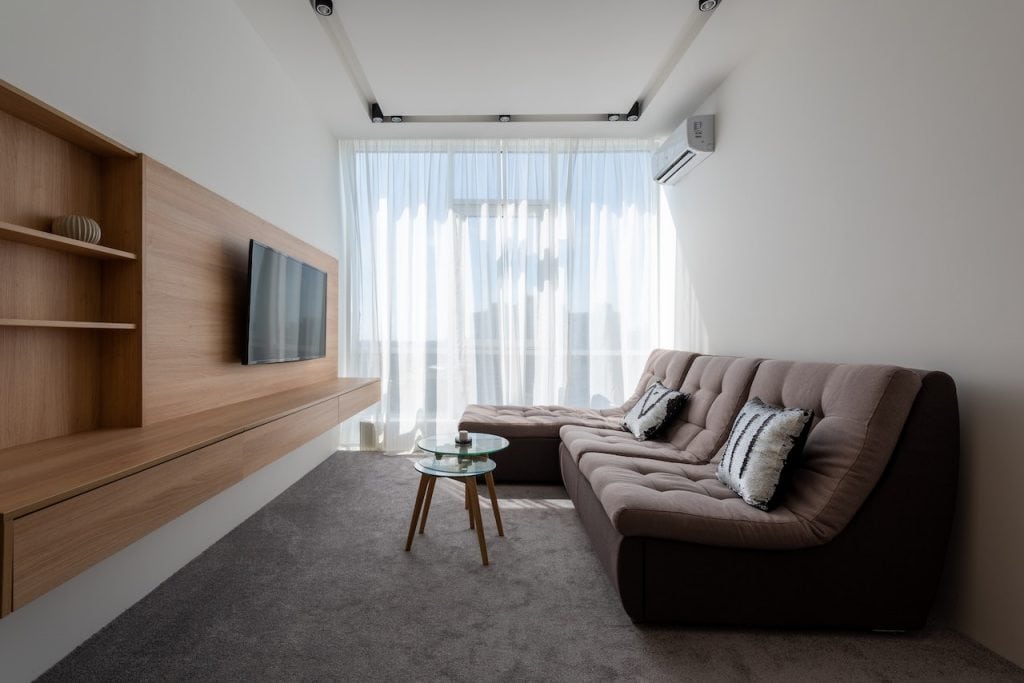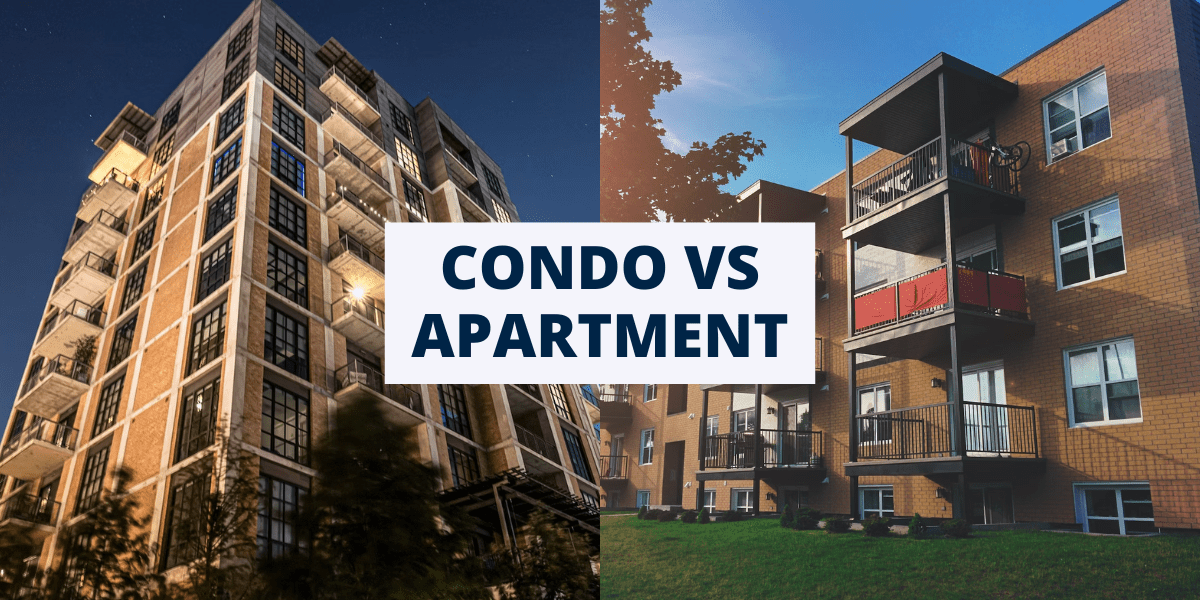Do you rent an apartment and wonder whether you should buy a condo instead? Or, do you live in a condo and think that the simplicity of apartment living sounds better? Many people wonder how to best choose between renting or buying.
The condo vs apartment argument poses several pros and cons. By thinking about your lifestyle, budget, and financial goals, you can decide which one will fulfill your individual needs.
In this blog post, we’ll discuss the differences between condos vs apartments and explore how you should select the right home for you.
Condo vs Apartment: What’s the Difference?
When looking to become a new homeowner, you can look at the advantages of condominium living. But what is a condo? Which might be better if you are choosing between a condo vs apartment?
Condos
A condominium, commonly known as a condo, is a type of residential property that you own. As the condominium owner, you will own everything inside your unit’s living space.
You also obtain access to shared spaces like hallways, lobbies, tennis courts, any green space, and stairwells with other owners in the building. Condominiums usually come with shared condo amenities like pools and fitness centers.
There are several advantages to owning a condo. First, it can be more affordable than buying or renting an entire house due to lower long-term maintenance costs. Owning a condo means having access to social activities organized by your neighbors within your complex. It is often hard to find this kind of condo community when living in an apartment.
You can lease your condo to someone else if you can’t or don’t want to live in the space. Unlike living in an apartment, you will pay homeowner’s association (HOA) fees. You are also responsible to pay for any required repairs.
Apartments
An apartment is a type of property that you rent rather than own. You will pay rent to the owner. An apartment owner is a landlord. You can select a unit based on its apartment amenities. These might include the following.
- Balcony
- Kitchen appliances
- Access to an outdoor pool or gym
- Laundry facilities
While owning a condo means paying for repairs, you don’t need to worry about this when renting an apartment. Instead, the landlord or property manager pays for the repairs or regular maintenance.
Pros and Cons: Condos vs. Apartments
Thinking about all the potential pros and cons between condos vs apartments is essential when making a decision between apartment renting and buying a condo.

Cost
The most pressing matter in terms of your living situation is how much you can afford. You will encounter various costs no matter which direction you go in.
Upfront Costs of Buying a Condo
Before buying a condo, you should be aware of the additional costs required for closing on your purchase. This can include the following items.
- Mortgage loan fees
- Property taxes
- Condo insurance premiums
- Appraisal fees
- Title search fees
Mandatory initiation fees for new buyers are usually a requirement of condominium associations. The monthly cost may vary from $500 to a whopping $5,000 depending on the services and facilities provided.
When buying from an individual owner, you can sometimes negotiate these fees. In comparison, dealing directly with a developer may not provide the same flexibility.
Ongoing Costs of Owning a Condo
In addition to making mortgage payments for your condo each month, you will also need to budget for your monthly HOA dues. These fees cover common area maintenance such as landscaping services and exterior building maintenance. They can also apply to other amenities such as access to swimming pools or fitness centers within the complex.
You can expect to pay anywhere from $50-$500 per month for HOA fees. Again, your fees will depend on the amenities accessed by you and other condo owners. Look over all paperwork before signing into a commitment for HOA dues.
Upfront Costs of Renting an Apartment
When renting an apartment, you still pay upfront costs to get into the building. These costs can include the first month’s rent plus security deposits. A property management company or landlord will charge a security deposit equal to one month’s rent plus any applicable pet-related deposits.
Depending on where you live, you may face requirements that include purchasing renters insurance. Landlords sometimes want these policies in place so they know you can cover losses that might include the following.
- Theft
- Fire
- Other property damage
Think about buying renters insurance even if your landlord doesn’t stipulate it in your rental agreement.
Ongoing Costs of Renting an Apartment
Renting an apartment will likely include the regular monthly cost of rent, your utilities, and any other fees associated with living in the building. Some landlords will ask renters to pay for the following utilities.
- Electricity
- Water
- Gas
- Garbage fees
Typically, you won’t pay anything extra when your apartment complex includes a fitness center or swimming pool. You will, however, most likely see a higher monthly rent payment compared to other complexes that do not offer these amenities.
Overall, expect to pay more in rent than what you might pay for a condo mortgage payment. You will probably experience continuously rising rental prices if you live in an area with higher demand than supply. In comparison, you can lock in a condo mortgage payment using a fixed mortgage.
Size and Layout
Consider the size and layout differences when deciding between a condo or an apartment. There are pros and cons to each that can impact your lifestyle choices. While apartments offer budget-friendly options with limited space, condos tend to have larger floor plans. Below, we will review these biggest differences in more detail.

The Size of a Condo vs. an Apartment
Size is one of the major differences between a condo and an apartment. An apartment is typically smaller than a condo. For instance, the average studio or one-bedroom apartment might measure anywhere from 400 to 800 square feet.
Conversely, condos can come in any size. You will find small studio condos on the market. You can also buy a three-bedroom unit spanning over 1,800 square feet or more. You may want to consider purchasing a condo instead of renting an apartment if you’re looking for more space.
Layout Differences Between Condos and Apartments
Another major difference between condos and apartments lies in their layouts. An apartment’s layout is often built around function rather than luxurious needs. The layout usually includes compact quarters with minimal features included.
With condos, though, you can discover spacious layouts that give you amenities that many people consider high-end features.
- Fireplaces
- Walk-in closets
- Extra storage space
- Built-in appliances
You’ll probably love living in a condo when looking for luxury finishes and plenty of space for entertaining guests.
Other size and layout factors to think about when comparing a condo against an apartment include the following.
- Floor Plans: Condos usually come with a variety of floor plans. Apartments tend to have limited options in this area. As a condo property owner, you will most likely choose from single and multi-level designs or even townhouses.
- Several Floors: Apartment buildings typically have more floors than condo buildings. It means that a condo unit will often have higher ceilings. You may find that you experience less noise when living in a condo due to stricter rules.
- Interior Finishes: Condos will often offer more luxurious interior finishes. You may experience the following high-end features.
- Marble or hardwood floors
- Granite countertops
- Stainless steel appliances
Apartments usually come with basic fixtures like the following.
- Carpeting
- Vinyl flooring
- Laminate countertops
Apartments typically have cheaper furnishings since landlords own those properties.
Maintenance and Repairs
Pay close attention here if you’re concerned about how to take care of and afford maintenance needs. There are differences in this area when comparing apartments vs condos.
For example, condo owners will typically pay a regular assessment fee to their condo association. It covers the cost of ongoing condo maintenance, repairs, and other upkeep for common areas. You don’t need to worry about these expenses when renting out an apartment.

Maintenance Responsibilities in a Condo
You will obtain greater control over property maintenance after purchasing a condo. It is a completely different situation as compared to the rental experience.
You have all the responsibility to maintain your condo unit. You might need to do the following on an ongoing basis.
- Mow the lawn
- Do regular yard work
- Clean out gutters
- Change light bulbs
- Unclog drains
You might even get into painting or doing roof repairs. Your maintenance responsibilities will depend on where you live and the association rules.
Maintenance Responsibilities in an Apartment
The landlord or maintenance team will take care of all maintenance situations when you decide to rent an apartment. You don’t own the building so there’s no need to worry about doing repairs or paying attention to the general upkeep of the building. Your landlord will also remain on the hook for larger repairs such as painting or roofing.
However, note that these services may come with additional fees or rent increases attached. Do your research. Read the fine print in the lease agreement. Obtain a full understanding of the included services before moving forward with a lease signing.
Rules and Regulations
You will need to weigh the pros and cons concerning the additional rules imposed upon you when comparing condos vs apartments. Each option offers differences that can impact your freedom and flexibility.
Pros and Cons of Condos
Condominiums have certain advantages over apartments when it comes to building rules and regulations. Condo owners typically enjoy greater freedom in terms of how they use their residential buildings.
While there are still restrictions, owners have more flexibility than apartment dwellers. As a renter, you may be subject to specific landlord rules about how you use your space. Another pro is that condo owners tend to have more control over the appearance or aesthetic of their individual units.
On the other hand, there are some cons associated with owning a condo vs an apartment. Condo boards often impose strict regulations on residents. These policies can make life less comfortable than one might expect in an apartment setting.
You may face restrictions such as:
- Limitations on noise levels at certain times
- Limitations on which appliances you can install in your unit
- Limitations on painting or remodeling your unit
Additionally, condos often come with higher fees than apartments due to any special amenities.
Pros and Cons of Apartments
Apartments have certain advantages over condos in terms of rules and policies. For starters, apartment units typically come with fewer restrictions than condos do.
While you may face a few limits imposed by landlords, renters often enjoy a little more freedom. Yes, pets may not be something you can keep in an apartment. However, you won’t experience the same board-imposed rules like you would in a condo.
As well, you don’t own the building when living as an apartment dweller. You don’t need to worry about maintenance costs or other expenses associated with owning real estate.
There are some drawbacks associated with renting an apartment versus owning a condo. Most notably, renters typically don’t get any say in how their living space looks or feels.
It means that if you want something changed or improved, you’ll need permission from your landlord. You can’t paint the walls or update your appliances, for instance. You need to ask if you can do anything regarding renovations or improvements while renting an apartment.
Choosing Between a Condo and an Apartment

Guess what? There is more to think through as you decide between going down the apartment vs condo route. Considering each of these factors will help you make smart financial decisions when it comes to your living situation.
Taxes
Think about the tax implications of a condo vs apartment. There are benefits to taking out real estate loans. You can write some of the mortgage expenses off on your taxes each year. The IRS lets real estate owners write off mortgage interest payments, for instance. A qualified accountant will help you understand the rules in this area.
Condo ownership brings better benefits in the area of achieving financial goals and lowering your tax payments. As a renter, you can’t take advantage of this area. The IRS doesn’t allow you to write off monthly payments for apartment rent. However, you might save more money in a retirement account because you aren’t paying HOA fees or expensive condo repairs.
Upfront Costs
Condos may require you to put more money down as a part of the purchase price. When buying a property, set aside money for closing costs and other fees. The down payment for a condo usually exceeds that of an apartment.
It’s a little cheaper to get started with your apartment renting goals. A landlord will ask for your rent payment to get things started. You might need to pay various security deposits as well.
Budget
Creating a budget is very different when it comes to a condo vs apartment. You basically need to think only about your rental amount when living in an apartment. You will need to set aside more money each month as an individual condo owner. Make sure you have cash set aside to handle repairs, association fees, and mortgage payments.
Lifestyle Differences
Consider how having a condo vs apartment impacts your lifestyle. Apartment renters can often move much more quickly than condo owners when they need to relocate.
You’ll probably enjoy apartment living more if you like to move around, check out a different city, and then move on. Or, you might work at a job that asks you to move around often. By renting, you might sign one-year leases so you maintain the freedom to pick up and leave more often.
When you own a condo, you may need to go through the process of selling if you want to live somewhere else. Choose a condo if you know for sure that you will remain in town for several years. A condo works well if you have a solid local job. Or, when you want to settle down with your spouse and raise your children in the same city.
Key Takeaways
On the whole, condo living is ideal for those who like having more control over their indoor or outdoor space and looking for a long-term investment. Apartment renting works better for those who don’t want to bother with upkeep or move often in search of a new adventure.
- Evaluate your budget
- Think about your preferred lifestyle
- Consider your tax situation
Take your time as you enter into the condo vs apartment decision. Weigh all the pros and cons. Think it through. Then, make your decision and take action. If you landed on buying a condo, check out our guide on what to expect when moving from a house into a condo.
FAQs
Do you still have questions about the key differences between a condo vs apartment? Read through the following answers to common questions. They should help you make a final decision between the two paths.
Is an apartment different from a condo?
Yes, an apartment is different from a condo. An apartment is usually individually leased and owned by the landlord or property management company. It typically has fewer amenities than a condo, such as shared recreational spaces, fitness centers, and pools. Additionally, most apartments come with basic appliances and utilities included in the monthly rent cost.
Is it better to live in a condo?
Living in a condo may be a better choice for you. Condos and apartments offer a variety of advantages and disadvantages, so the decision mainly comes down to your personal needs and preferences.
Which is more expensive: condo vs apartment?
When it comes to upfront and ongoing costs, condominium units tend to be more expensive than apartments. It is because condo ownership typically involves fees for the condo association as well as homeowners insurance.
Condo fees can range from a few hundred dollars per month to over a thousand. It all depends on the condo complex you live in and the amenities offered by the HOA. You will pay all utilities as well as your mortgage and association fees.
You will avoid all of these payments if you rent an apartment. Most apartments have a flat rent fee each month that covers all utilities and amenities in the entire building.
Is a condo just a flat?
An apartment is closer to a flat than a condo. People in Europe use the flat term to describe their apartments.
Can I rent a condo?
If you find a condominium owner looking to lease their condo space, you can rent the condo. While many condo owners buy their space to live in it, some like to rent out their condos to others.
What are the disadvantages of a condo?
One downside to condo living is the regulations. Condo owners must abide by all homeowners association rules. These policies can include anything from how many people you can have in your unit at one time, to what kind of furniture and decorations you can have in common areas.
What is the point of owning a condo?
One advantage is sharing costs spread out between the other condo owners. While you may have more expenses than apartment renters, you will find these expenses less than buying a single-family home.
Are condos a good investment?
Similar to buying any other type of real estate, you need to factor in the location, market conditions, potential resale value, and more. In some cases, condo units can be a quality investment as condo prices tend to appreciate over time.
What are condo fees used for?
Condo fees are what condo owners collectively pay to the condo association to maintain and manage the condo building. These funds pay for costs such as maintenance, repairs, condo insurance premiums, landscaping, common area utilities, and more. The amount of condo fees varies depending on the type and size of the condo unit you own.
Do you pay monthly for a condo?
Yes, condo owners must generally make monthly condo fee payments plus mortgage payments. Your mortgage will vary based on your credit score and the real estate market in your local area.
Do you pay property tax on a condo?
Yes, condo owners must pay property taxes on their housing units. The local municipality bases the amount on the value of your condo unit and the tax rate in your area. One disadvantage compared to individual homeowners is that you receive a smaller amount of services from the county or city.





